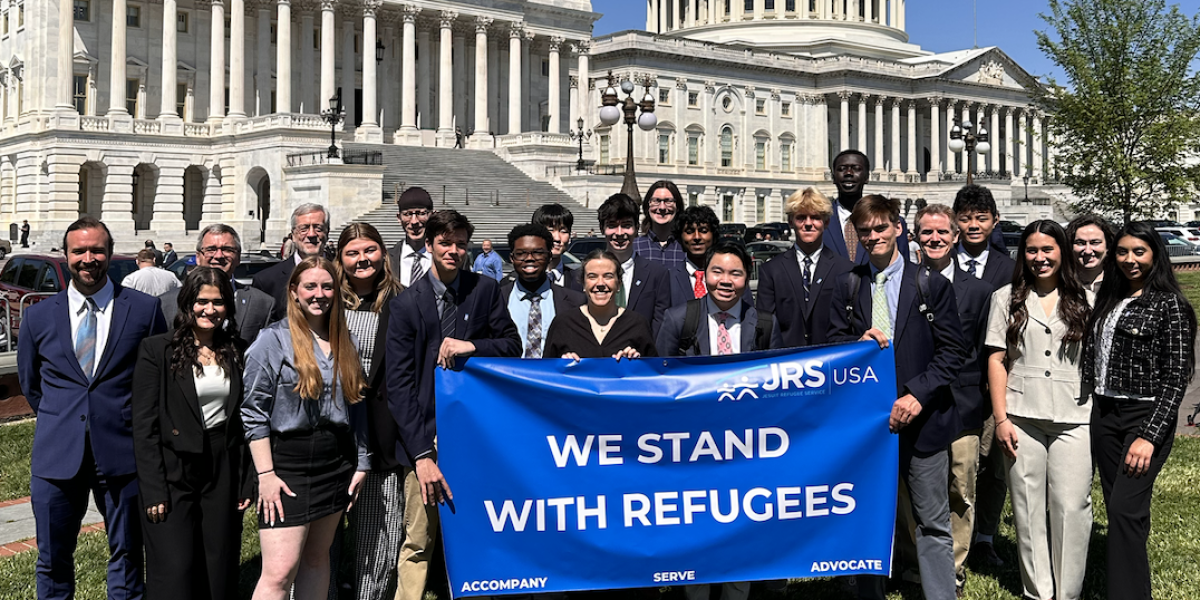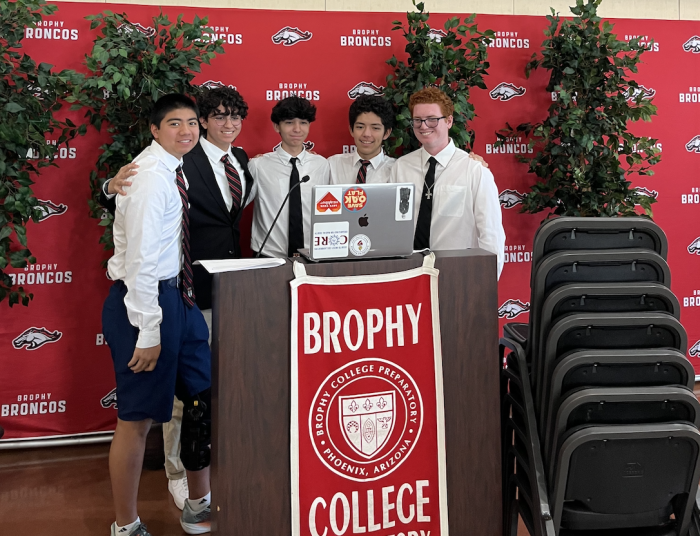JRS/USA Advocacy Day 2024: Raising Voices for Refugees
19 April 2024|Chloe Gunther

On April 16, over 200 advocates from across the country met with policymakers as part of JRS/USA’s annual Advocacy Day, urging them to address critical issues affecting refugees.
Through virtual platforms and in-person meetings on Capitol Hill, students, teachers, parishioners, and clergy “spoke up for people who might not have a voice in the nation’s capital,” as advocate, Tim Hoye said.
They addressed three main issues in their meetings: protecting asylum at the US – Mexico Border, supporting funding for refugee assistance in the FY25 State and Foreign Operations Appropriations bill, and passing the Climate Displaced Persons Act.
“Sometimes trying to change these systems can feel like just scratching a wall, but really the job is to pass the baton,” Maggie Lauder, a teacher at Brophy College Preparatory and Advocacy Day participant said.
This is a sentiment she instills in her students, twelve of whom participated in Advocacy Day. They met with five offices throughout the day, engaging with representatives on both sides of the aisle. “What I hear from students is that they feel so empowered when they have these meetings, they realize this is a system they can engage in. That’s really powerful,” Maggie said.
At Brophy, these students are part of an advocacy club. They have held campaigns and partnered with local organizations for migrants in Arizona. They are consistently intentional about centering these meetings and conversations on the real lives and experiences of people on the move, Maggie explained.
Several of the students come from families of mixed citizenship status and/or have close friends who have experienced displacement. Maggie sees their advocacy work, in part, as a testament of the bonds and solidarity the students have created with one another.
“At the end of our meetings, each student shared their personal relationship to refugee and migrant rights,” she said, noting how the students drew a clear line between policies and personal impact for their representatives.
For Adilei, a sophomore from Rockhurst University, Advocacy Day is a part of her and her classmates’ work to create systemic change. “There is so much potential for youth to make a difference wherever they are, it might not seem like a big deal, but one meeting or policy can cause a chain reaction, we should never give up on advocacy work,” she said.
Her first experience meeting with representatives was at the Ignatian Family Teach-In for Justice in the fall of 2023. She said this initial experience motivated her to participate in JRS’s Advocacy Day. “I was really nervous ahead of our first meeting but having been to DC before and with the resources from JRS, I felt well prepared. It was a really empowering experience,” she said.
Fr. Sudzer Charelus, S.J., a Jesuit priest, echoed how inspiring it was to see the students in his group from Belen Jesuit Preparatory School lead the conversation with their representatives. “They were outstanding,” he said, “it’s incredible, seeing them do that gives me so much hope.”
Fr. Sudzer is from Haiti and now lives in Miami. As a Jesuit novice in Haiti, Fr. Sudzer worked at the border between Haiti and the Dominican Republic, accompanying Haitians and working to protect the rights of migrants. After attending Boston College, his provincial sent him to Miami to create a program to accompany migrants in the city.
“When I speak of migration, I speak from the core of my being,” Fr. Sudzer said. When he was three years old, his father left Haiti to find work in the United States so that he could pay for his children’s wellbeing and education.
 “My father is one among millions of people who left home for a better life,” Fr. Sudzer said. Decades later, between natural disasters and conflict, the situation in Haiti has worsened. He still has cousins and close friends in the country, he said it is difficult to hear them talk about what they are experiencing.
“My father is one among millions of people who left home for a better life,” Fr. Sudzer said. Decades later, between natural disasters and conflict, the situation in Haiti has worsened. He still has cousins and close friends in the country, he said it is difficult to hear them talk about what they are experiencing.
“This is why we have so many Haitians coming to the US now, and what is happening in Haiti is happening in so many places in the world,” Fr. Sudzer said. “That is why we must speak with policymakers about creating better systems of support.”
Fr. Sudzer also shared how advocacy is intertwined with Christianity. “For Christians, advocacy is a part of our prophetic work to bring joy to all human beings and renounce any barriers to people experiencing that.”
“We need more people, more hands to do this work,” Fr. Sudzer said. “Continue to be the light of God,” he said in his message to fellow advocates, “continue to inspire those around you.”



